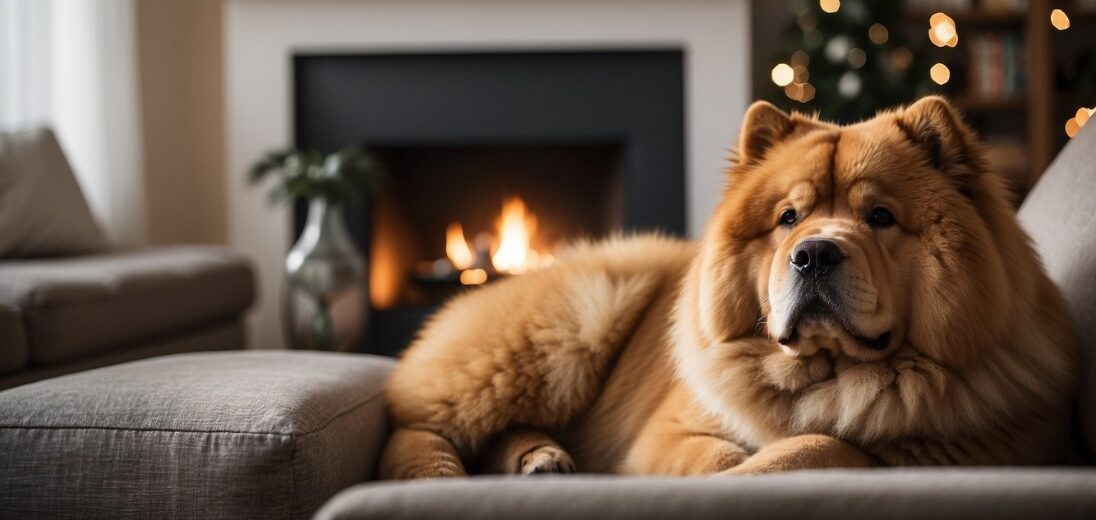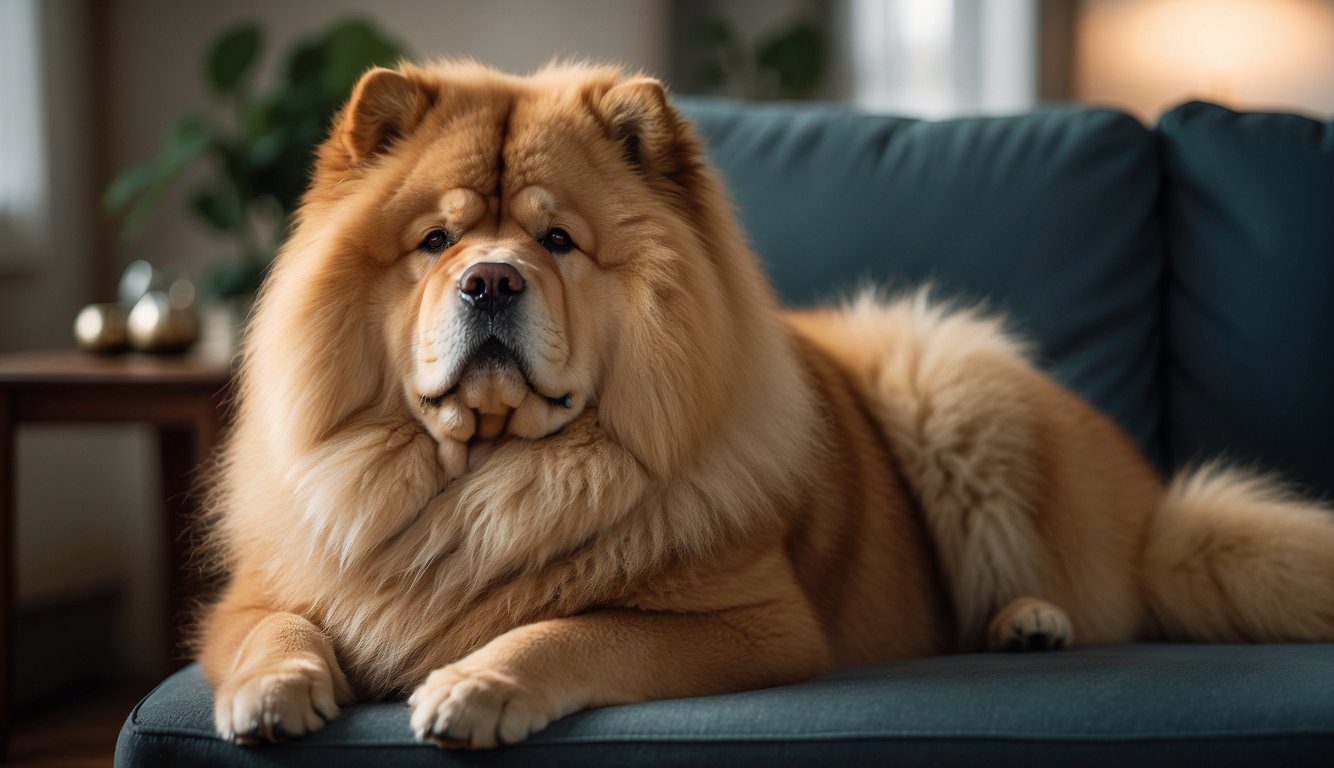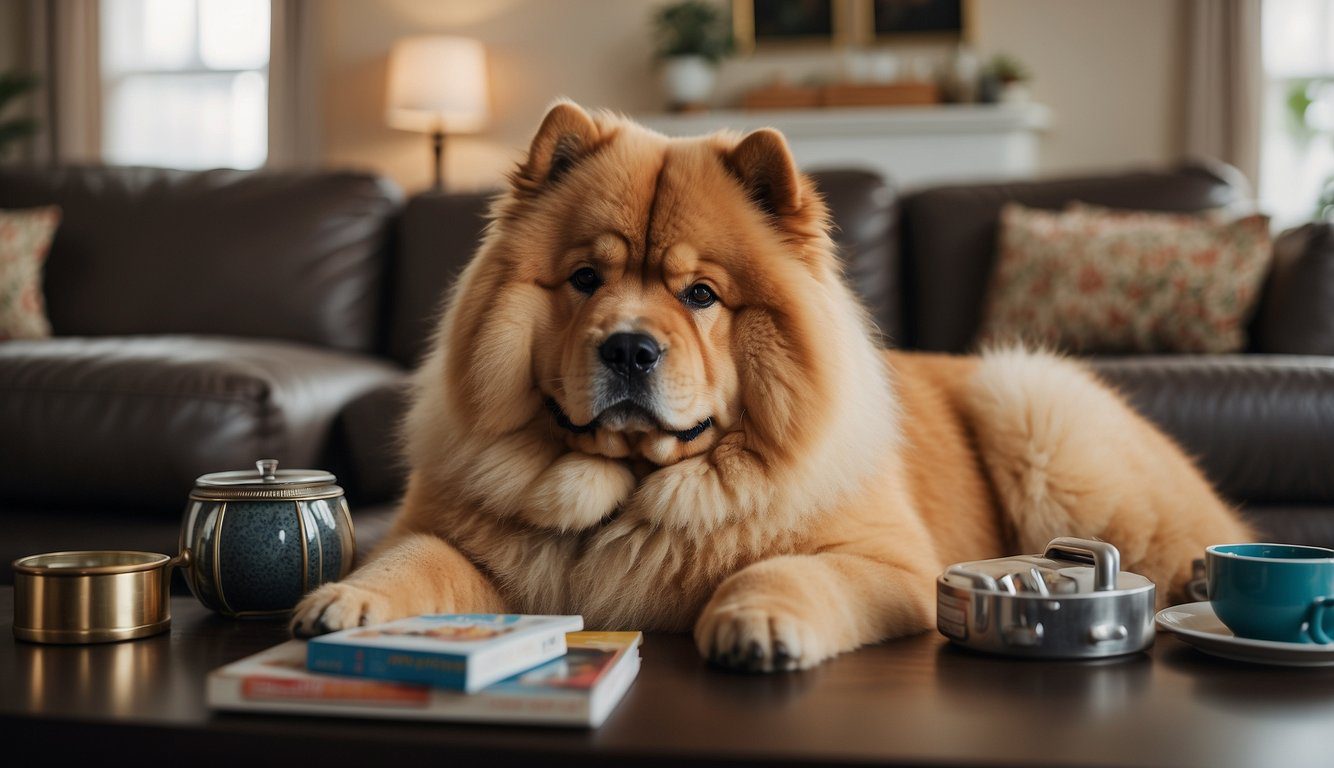What to Know
Is a Chow Chow a Good House Dog?
Thinking about getting a Chow Chow as a house dog? These fluffy, bear-like pups can make great companions for the right owner.
Chow Chows can be good house dogs if properly trained and socialized from a young age. They’re naturally clean and easy to housebreak, which is a big plus for indoor living.
Chow Chows are known for their calm and dignified nature. They don’t need tons of exercise, making them well-suited for apartment life. But keep in mind, that they’re not always the best fit for homes with young kids.
Their independent streak means they need an owner who can provide firm, consistent training.
Before you bring a Chow Chow home, think about your lifestyle. Do you have time for daily grooming? Can you handle a strong-willed dog?
If you’re up for the challenge, a Chow Chow might be the perfect furry addition to your home. These unique dogs can be loyal, loving companions when given the right care and attention.
Key Takeaways
- Chow Chows need early training and socialization to be good house dogs
- They’re clean, quiet, and don’t require much exercise
- Consider your lifestyle and ability to meet their grooming and training needs
Origin and History

The Chow Chow’s roots run deep into ancient China, where these fluffy pups were treasured by royalty. Their journey from Eastern palaces to Western homes is a tale of intrigue and changing fortunes.
Ancient Roots and Royal Connections
Did you know your Chow Chow has royal blood? These fuzzy friends first appeared in China over 2,000 years ago during the Han Dynasty. They weren’t just pets – they were working dogs and even dinners in tough times!
Chinese nobles loved Chows for their lion-like looks and loyal nature. They guarded palaces and joined hunts. Some say emperors kept 2,500 pairs of Chows to hunt with!
As time passed, Chows became symbols of status. Only the rich could afford these regal pups. Their thick fur even got used to make warm coats.
The Chow’s Journey to the West
Your Chow’s ancestors had quite the adventure coming to America! In the late 1800s, Queen Victoria fell in love with Chows and brought them to England. Talk about a royal welcome!
From there, Chows sailed to the US. They quickly won hearts with their unique blue-black tongues and fluffy coats. By 1903, the American Kennel Club recognized the breed.
Chows faced ups and downs in popularity. During World War II, many were sadly killed in China. But their charm helped them bounce back. Today, you can find these cuddly bears in homes across America, still rocking that regal air from their royal past.
Physical Characteristics and Temperament

Chow Chows are unique dogs with striking looks and complex personalities. They have several standout traits that make them instantly recognizable and require special understanding from their owners.
Distinctive Features
Chow Chows have a bear-like appearance that’s hard to miss. Their most famous feature is a blue-black tongue, which sets them apart from other breeds.
These medium-sized dogs stand about 17-20 inches tall and have a muscular build. Their coat comes in two types: rough or smooth. The rough coat is thick and fluffy, while the smooth coat is shorter but still dense. Both types shed a lot, so be ready for regular brushing.
Chow Chows move with a unique stilted gait. This gives them a regal, almost lion-like strut that matches their dignified personality.
Understanding the Chow Chow’s Disposition
Chow Chows have a reserved and independent nature. They’re not typically bouncy or overly affectionate dogs. Instead, they’re calm and dignified, often described as cat-like in their behavior.
These dogs are loyal to their families but can be aloof with strangers. Early socialization is key to helping them be more comfortable around new people and situations.
Chow Chows are also protective of their homes and families. This makes them good watchdogs, but it’s important to train them properly to prevent overprotectiveness.
They’re intelligent but can be stubborn. Training requires patience and consistency. Use positive reinforcement techniques to keep your Chow engaged and willing to learn.
Care and Training Essentials

Chow Chows need special attention to thrive as house dogs. You’ll need to focus on grooming, exercise, and training to keep your furry friend happy and well-behaved.
Proper Grooming Practices
Your Chow Chow’s thick double coat requires regular care. Brush your pup at least 2-3 times a week to prevent matting and reduce shedding. During shedding seasons, daily brushing is a must.
Use a slicker brush and metal comb to tackle that dense fur. Pay extra attention to the neck area, where the fur is thickest.
Bathe your Chow every 6-8 weeks, or when they get dirty. Be sure to rinse thoroughly and dry completely to avoid skin issues.
Don’t forget about nail trimming, ear cleaning, and teeth brushing. These should be part of your regular grooming routine.
The Importance of Exercise and Play
Chow Chows need moderate exercise – about 45-60 minutes daily. This keeps them healthy and prevents boredom-related behavior issues.
Take your Chow for daily walks. They enjoy exploring new scents and sights. Just remember, they’re not built for intense exercise or long runs.
Playtime is crucial too. Try games like fetch or hide-and-seek to keep your pup mentally stimulated. Puzzle toys are great for indoor entertainment.
In hot weather, keep exercise sessions short. Chows are prone to overheating due to their thick coats.
Training and Socialization Techniques
Start training your Chow Chow early. These independent pups can be stubborn, so consistency is key. Use positive reinforcement techniques like treats and praise.
Begin with basic commands at 7-8 weeks old. Make your Chow sit before meals to reinforce good manners.
Socialization is crucial. Expose your pup to various people, animals, and situations early on. This helps prevent aggression and fear later in life.
Obedience classes can be helpful. They provide structure and help your Chow learn to interact with other dogs.
Remember, patience is essential. Chows aren’t eager to please like some breeds, so keep training sessions short and engaging.
Health and Nutrition

Keeping your Chow Chow healthy involves understanding their unique needs. These fluffy pups have specific health concerns and dietary requirements that you’ll need to know about.
Common Health Concerns
Chow Chows can face several health issues you should watch out for. Eye problems like entropion, where the eyelids roll inward, are common. You’ll notice excessive tearing or your pup rubbing their eyes if this occurs.
Hip and elbow dysplasia can also affect these sturdy dogs. If you see your Chow limping or having trouble getting up, it’s time for a vet visit.
Skin issues are another thing to keep an eye on. Their thick coat can hide skin problems, so regular grooming is a must. Look for any redness, bumps, or bald patches when brushing.
Allergies can bother Chow Chows too. If you notice excessive scratching or licking, it might be time to check their diet or environment for triggers.
Feeding Your Chow Chow
Your Chow Chow needs a balanced, protein-rich diet to stay healthy. Look for dog food with real meat as the first ingredient. Chicken, turkey, or beef are great protein sources for these pups.
Avoid foods with lots of fillers or artificial additives. Chow Chows can have sensitive tummies, so stick to high-quality ingredients.
How much to feed depends on your dog’s size, age, and activity level. A typical adult Chow might need 2-3 cups of dry food daily, split into two meals.
Don’t forget about treats! Lean meats and fish can be healthy snacks. Just remember to keep treats to less than 10% of their daily calories.
Always have fresh water available. Chow Chows can be prone to bloat, so avoid exercising right after meals.
FAQs
Chow Chows are unique dogs with specific needs and behaviors. Let’s dive into some common questions about these fluffy companions to help you decide if they’re the right fit for your home.
How do Chow Chows generally behave within a home environment?
Chow Chows are quiet and mannerly in the home. They’re often compared to cats due to their independent nature. You’ll find them lounging around, keeping an eye on things.
These pups are naturally clean, making them easy to housebreak. They won’t be bouncing off the walls or causing chaos. Instead, they prefer to chill and observe.
Can I expect a Chow Chow to be a suitable pet if I have children?
Chow Chows can be tricky with kids. They’re not typically recommended for families with young children. These dogs can be protective and may not tolerate rough play.
If you have older, respectful children, it might work. But supervision is key. Always teach your kids how to interact safely with your Chow Chow.
What should I know about the temperament of Chow Chows?
Chow Chows are known for their noble and aloof personality. They’re not overly affectionate with everyone they meet. Think of them as the strong, silent type.
These dogs are loyal to their families but can be standoffish with strangers. Early socialization is crucial to help them be more accepting of new people and situations.
How much exercise does a Chow Chow typically need?
Good news for couch potatoes – Chow Chows need only moderate exercise. They’re not high-energy dogs that require hours of playtime.
A daily walk and some playtime in the yard should do the trick. Just be careful in hot weather – their thick coat can make them overheat easily.
Are there common behavioral issues associated with Chow Chows that I should be aware of?
Chow Chows can be stubborn and independent. They might challenge your authority if not properly trained. Consistency is key when working with these strong-willed pups.
Some Chow Chows can be aggressive if not socialized properly. Early training and socialization are crucial to prevent this issue.
What kind of care and attention do Chow Chows require when living indoors?
Your Chow Chow will need regular grooming to keep that fluffy coat in check.
Brush them a few times a week to prevent matting and reduce shedding.
These dogs are prone to certain health issues like hip dysplasia and eye problems.
Make sure to take them for regular vet check-ups to catch any issues early on.
Chow Chows can be sensitive to heat due to their thick coat.
Make sure your home is cool and comfortable, especially during summer months.

